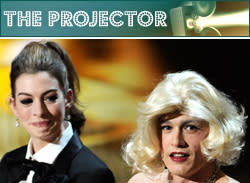James Franco Flops at the Oscars

A couple weeks ago, James Franco was asked about how was he was feeling in the buildup to his first time hosting the Academy Awards, one of the toughest gigs in all of entertainment. Franco didn't sound all that concerned. "It's fine, it's like one night," he said, practically laughing at the question. "So, it doesn't matter. Like, if I host the worst Oscar show in the history of the Oscars, like, what do I care, you know what I mean? I'll try my best, but I don't see any shame."
At that time, it seemed like the right attitude. Rather than putting intense pressure on himself and his co-host, Anne Hathaway, he was being Zen about the whole thing: He'll do his best, and whatever happens happens.
Well, we've now seen the job he did, and we have to ask: Was that really his best? We sure hope not.
The evening started off relatively promising with a pre-taped segment in which he and Hathaway were digitally inserted into different Best Picture nominees (and "Back to the Future") that was akin to the shtick Billy Crystal used to do when he hosted the show. It was a cute, occasionally funny segment that established their comedic rapport for the night: Franco was the dopey straight man to Hathaway's adorable manic goofball. But then the broadcast began ... and everything went wrong for Franco.
During a blessedly brief opening monologue, he and Hathaway did a few pretty obvious gags: Franco pretended to be confused that Hathaway wasn't nominated like he had been; he did a bit with his grandma where she talked about meeting "Marky Mark"; he asked Hathaway what he gets if he won Best Actor. The jokes may not have been particularly sharp, but what was most striking is that Franco hardly seemed invested in any of the material. This, in theory, is his appeal: When he's in a comedy like "Pineapple Express" or hosting "Saturday Night Live," he plays the out-of-it dude who's off on his own little wavelength. But rather than underplaying, he seemed like he was hardly there.
If Franco seemed to vanish on stage, Hathaway tried to compensate with a nervous, gushing enthusiasm. For those who had questioned their pairing from the get-go, the rationale was that they were chosen to appeal to a younger demographic, which they joked about (rather awkwardly) early in the broadcast. But what's funny is that if these two people were meant to represent Hollywood's Bright New Stars, they were on opposite sides of the spectrum: Franco stood in for all those actors who (sincerely or not) project a disinterested nonchalance about being embraced by the Academy, while Hathaway was the eager beaver who desperately wanted to be accepted. This could have made for a funny juxtaposition, but Franco was lifeless, dragging Hathaway's flop-sweat showmanship down with him.
Or maybe he was just exhausted: Right before the broadcast, he admitted to Krista Smith that he'd only been rehearsing the show on the weekends because of his course load at Yale. In the run-up to the show it's been an ongoing joke about just how busy Franco is with all of his other projects, but Sunday's show demonstrated the danger of not dropping everything and focusing on the Oscars: He seemed distracted and a beat off, no more so than during a bit where he showed up on stage wearing a dress in response to Hathaway in a tux. Again, maybe it would never have been funny, but Franco never even gave it a chance. (All of this is even weirder considering he recently declared that Ricky Gervais "bombed" as host of the Golden Globes: At least Gervais gave off the impression that he was interested in performing.)
Because they had become the poster children for the Oscar's official youth movement, Franco and Hathaway have probably guaranteed that nobody under the age of 50 will be allowed to host the Oscars for at least five years. (Unless, of course, it turns out that the ratings are astronomical.) The producers did a lot to trim down the show's usually gargantuan running time -- no long opening monologue, no special segments devoted to the Best Picture nominees, presenters introducing multiple categories -- but if the broadcast wasn't long, it instead just felt deathly slow and meager. The energy that Franco was supposed to provide didn't happen: Frankly, if his significant contribution to the broadcast was behind-the-scenes tweets, we'll settle for the boring and stodgy hosts we've had in the past.
But one of those video tweets did prove prophetic: Right before he was about to go on stage to start the show, he was asked if he had any last words. "It might be bad," he said, somewhere between a grin and a grimace. The person videotaping assured him he would do great. "It might be bad," he said again. "It might be horrible." Two weeks ago, he had laughed off the worst-case scenario: Right at that moment Sunday night, he seemed to recognize that the worst-case scenario was about to happen. And we all had to sit through it.

